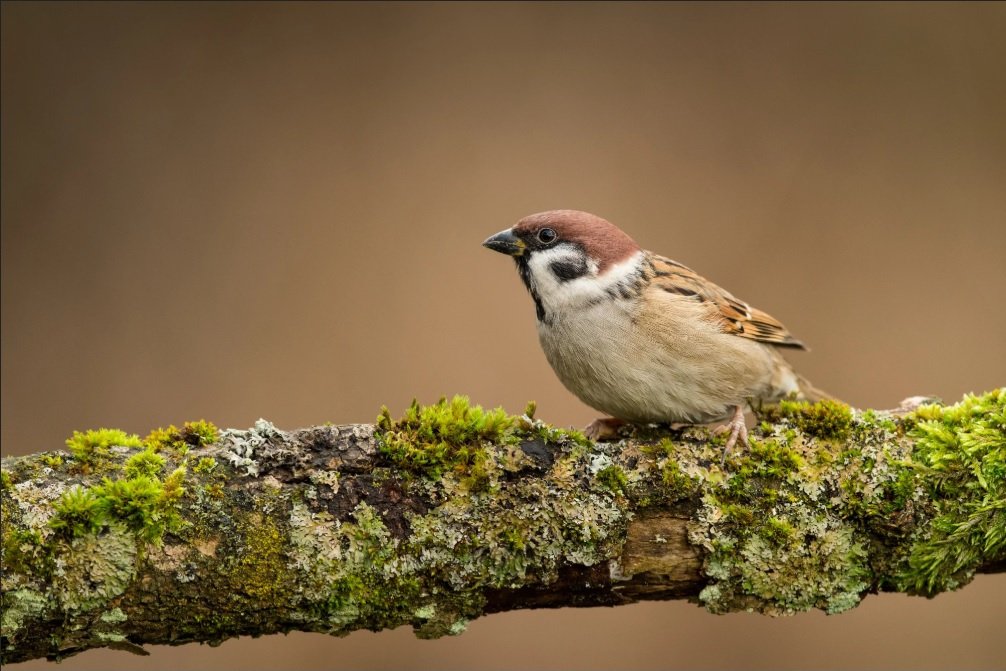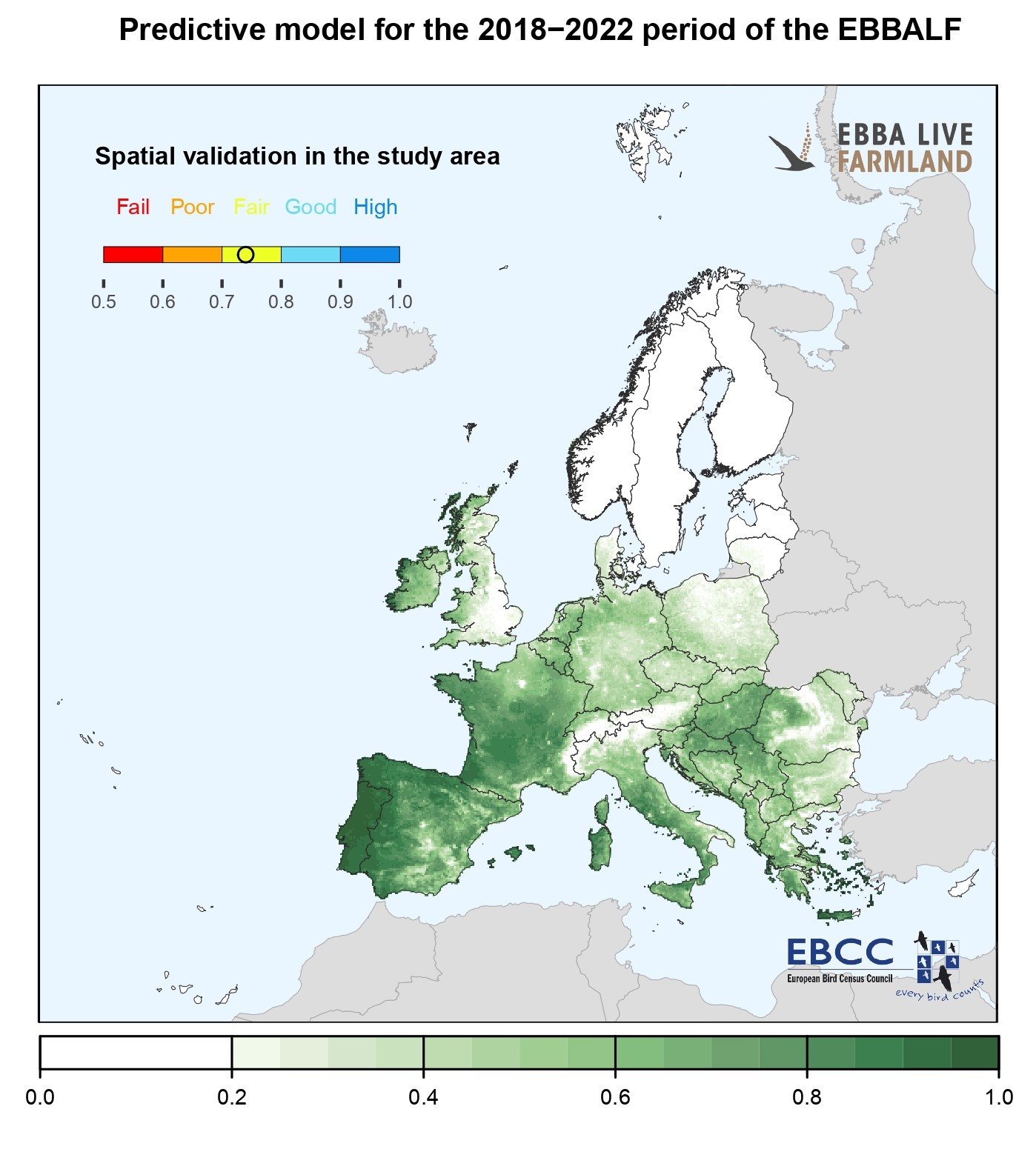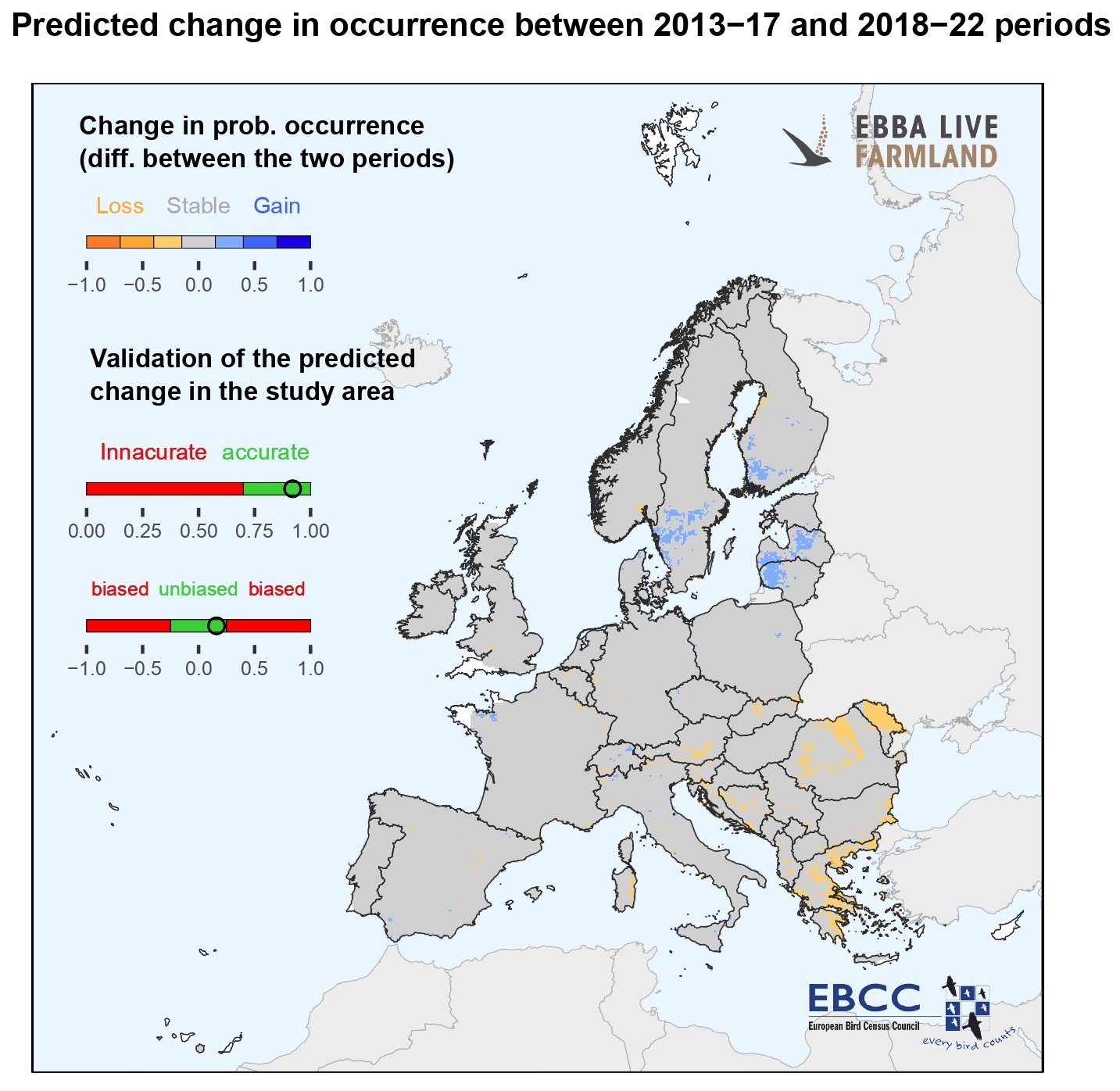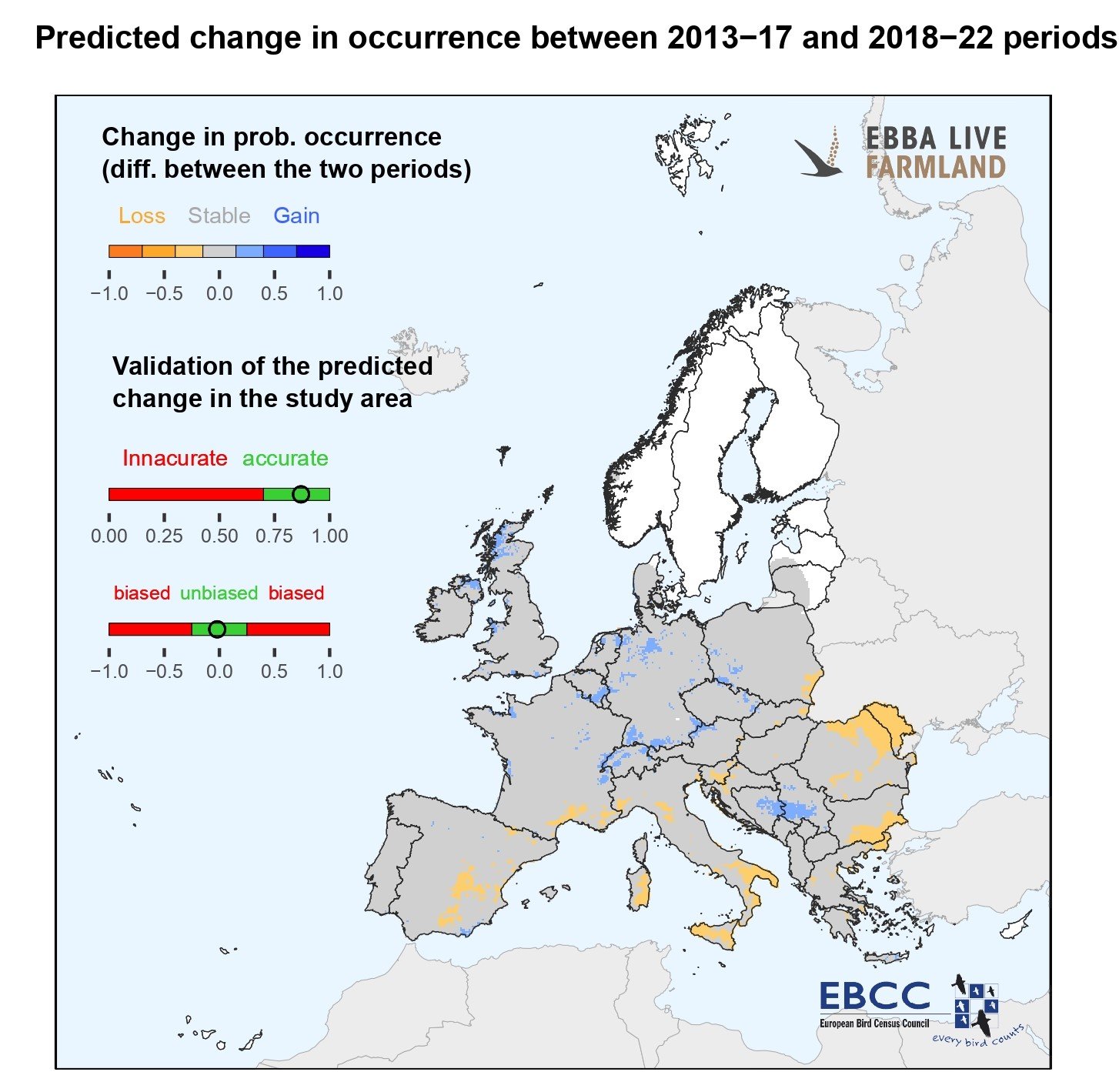UPDATING DISTRIBUTIONS OF FARMLAND BIRDS IN EUROPE
The publication of the European Breeding Bird Atlas 2 (EBBA2) represented a milestone for European ornithology. Developing a European atlas takes time, and 30 years elapsed between EBBA1 and EBBA2. Updating data on species’ distributions on a more frequent basis and ensuring that they are harmonised across Europe could complement the role of atlases. The European Bird Census Council (EBCC) has started the project EBBA Live, which attempts to fill in this gap of information for as many species as possible. This ambitious project has started with a pilot project on farmland birds, which is called EBBA Live Farmland.
 The group of farmland birds has been selected for the pilot work in EBBA Live for its known general decline and conservation concern. This picture shows the Eurasian Tree Sparrow Passer montanus, whose populations in Europe have had a moderate decline during the period 1980–2022 (www.pecbms.info) Author: Zdeněk Jakl
The group of farmland birds has been selected for the pilot work in EBBA Live for its known general decline and conservation concern. This picture shows the Eurasian Tree Sparrow Passer montanus, whose populations in Europe have had a moderate decline during the period 1980–2022 (www.pecbms.info) Author: Zdeněk Jakl
EBBA Live Farmland is based on EBBA2 principles, and data and on data from the Pan-European Common Bird Monitoring Scheme (PECBMS) and EuroBirdPortal (EBP). The species list consists of 50 species categorised in EBBA2 as agricultural/grassland, including those that are used for the generation of the Farmland Bird Indicator. Products are maps showing the occurrence of breeding birds.
Phase I. During the years 2022 and 2023, ornithological organisations from 35 countries participated in the first phase of the project by providing PECBMS and other monitoring data for farmland birds, expertise in validating data and outcomes. The analysis was restricted to western and central Europe. The time span covered by the updated maps in the first phase is the five-year period following the end of EBBA2 fieldwork, that is, 2018–2022. The results of this phase show that the existing network of bird monitoring could be used to update the breeding distributions of farmland birds at 10-km resolution by means of spatial distribution modelling techniques. The work for this phase was carried out in the context of the EuropaBON project WP5.1.
 Map showing the probability of occurrence of the breeding population of the Eurasian Tree Sparrow Passer montanus in the study area in the period 2018–2022. Data come mostly from PECBMS monitoring sites, but other monitoring data have been included as well, especially for the Western Balkans. Validation statistics as in EBBA2 (see EBBA2 Methods).
Map showing the probability of occurrence of the breeding population of the Eurasian Tree Sparrow Passer montanus in the study area in the period 2018–2022. Data come mostly from PECBMS monitoring sites, but other monitoring data have been included as well, especially for the Western Balkans. Validation statistics as in EBBA2 (see EBBA2 Methods).
 Map showing the probability of occurrence of the breeding population of the Common Stonechat Saxicola torquatus in the study area in the period 2018–2022. Data come mostly from PECBMS monitoring sites, but other monitoring data have been included as well, especially for the Western Balkans. Validation statistics as in EBBA2 (see EBBA2 Methods).
Map showing the probability of occurrence of the breeding population of the Common Stonechat Saxicola torquatus in the study area in the period 2018–2022. Data come mostly from PECBMS monitoring sites, but other monitoring data have been included as well, especially for the Western Balkans. Validation statistics as in EBBA2 (see EBBA2 Methods).
Phase II. One of the main outcomes of the first phase was that gaps in monitoring data do not allow to generate observed distributions in a satisfactory manner, even at a coarse resolution of 50 x 50 km. Modelling is the only option to produce maps with PECBMS data. The incorporation of a huge amount of casual and semi-structured data from EBP in Phase II is expected to improve the situation by improving 10-km modelled maps and also allowing the production of 50 x 50 km maps of observed breeding occurrence as in EBBA2. The second phase of the project is developed in the context of the LIFE EBP Reinforcement project.
Change in distribution
Robustly assessing changes in distribution every few years is more challenging than updating distributions. First trials in Phase I indicated that this could be assessed using monitoring data, at least for the widespread species, but there are various ways of estimating change, and this crucial issue is now under development. However, a couple of examples of the estimated change in the probability of occurrence between the EBBA2 period (2013–2017) and the EBBA Live Farmland Phase I period (2018–2022) are shown here.
 Preliminary map of change in the probability of occurrence of the Eurasian Tree Sparrow Passer montanus between the EBBA2 period (2013–2017) and the EBBA Live Farmland Phase I period (2018–2022). All data come from PECBMS monitoring sites repeated in the two periods. Validation statistics based on Rapacciuolo et al. 2014.
Preliminary map of change in the probability of occurrence of the Eurasian Tree Sparrow Passer montanus between the EBBA2 period (2013–2017) and the EBBA Live Farmland Phase I period (2018–2022). All data come from PECBMS monitoring sites repeated in the two periods. Validation statistics based on Rapacciuolo et al. 2014.
 Preliminary map of change in the probability of occurrence of the Common Stonechat Saxicola torquatus between the EBBA2 period (2013–2017) and the EBBA Live Farmland Phase I period (2018–2022). All data come from PECBMS monitoring sites repeated in the two periods. Validation statistics based on Rapacciuolo et al. 2014.
Preliminary map of change in the probability of occurrence of the Common Stonechat Saxicola torquatus between the EBBA2 period (2013–2017) and the EBBA Live Farmland Phase I period (2018–2022). All data come from PECBMS monitoring sites repeated in the two periods. Validation statistics based on Rapacciuolo et al. 2014.
List of countries and ornithological organisations participating in EBBA Live Farmland (phase I)
Andorra
Andorra Research + innovation
Austria
BirdLife Austria
Belgium
AVES/Natagora
Research Institute Nature and Forest
Bosnia and Herzegovina
Naše Ptice and Society for Research and Protection of Biodiversity
Bulgaria
Bulgarian Society for the Protection of Birds
Croatia
Ministry of Energy and Sustainable Development, Institute for Environmental and Nature Protection
Croatian Society for Protection of Birds and Nature
Cyprus
BirdLife Cyprus
Czechia
Institute of Environmental Studies, Faculty of Science, Charles University
Czech University of Life Sciences, Faculty of Environmental Sciences, Prague
Czech Society for Ornithology
Denmark
Danish Ornithological Association (BirdLife Denmark)
Estonia
Estonian Ornithological Society / BirdLife Estonia
Finland
Zoological Museum, Finnish Museum of Natural History
France
National Natural History Museum
Ligue pour la protection des oiseaux
Germany
Federation of German Avifaunists
Greece
Hellenic Ornithological Society
Hungary
University of Nyiregyhaza
Hungarian Ornithological and Nature Conservation Society (BirdLife Hungary)
Ireland
BirdWatch Ireland
Italy
Italian League for Bird Protection
Latvia
Latvian Ornithological Society
Department of Zoology and Animal Ecology, Faculty of Biology, University of Latvia
Liechtenstein
Liechtenstein Botanical-Zoological Society
Lithuania
Lithuanian Ornithological Society
Luxembourg
Centre Ornithological of Luxembourg
Moldova
Society for Birds and Nature Protection
Montenegro
Centre for Protection and Research of Birds
Netherlands
Sovon, Dutch Centre for Field Ornithology
North Macedonia
Macedonian Ecological Society
Norway
Norwegian Institute for Nature Research
Norwegian Ornithological Society / BirdLife Norway
Poland
Museum and Institute of Zoology, Polish Academy of Sciences
Polish Society for the Protection of Birds
Portugal
University of Évora
Portuguese Society for the Study of Birds
Romania
Romanian Ornithological Society
Serbia
University of Novi Sad, Faculty of Sciences, Department of Biology and Ecology
Bird Protection and Study Society of Serbia / BirdLife Serbia
Slovakia
Slovak Ornithological Society / BirdLife Slovakia
Spain
Spanish Society of Ornithology / SEOBirdLife
Catalan Ornithological Institute, GOB Mallorca, SOM Menorca
Sweden
Lund University, Department of Biology
Swedish University of Agricultural Sciences, The Swedish Species Information Centre
Switzerland
Swiss Ornithological Institute
United Kingdom
British Trust for Ornithology








